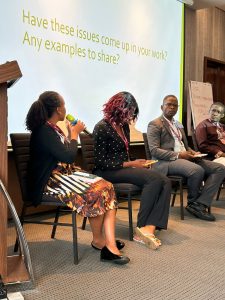Share the post "The multistakeholder approach in internet governance: Why it really matters"

By Judith Murungi
During the African School on Internet Governance (AfriSIG) held in Abuja, Nigeria from 13 to 18 September 2023, the essence of the multistakeholder approach in internet governance was emphasised.
The internet is very dynamic and therefore it requires a different form of governance structure. Due to the vastness and the intricacies of the internet, it is only prudent that governance structures and systems open themselves up to collaborate with other stakeholders in order to best regulate the internet.
The multistakeholder approach is referred to as a set of practices that individuals or organisations can follow to create strategies and policies that enhance internet governance. According to the Internet Society, the multistakeholder governance framework is informed by three components: opened-ended unleashed innovation (infrastructure), decentralised governance institutions (governance) and open and inclusive processes (human).
This approach lays a vital basis for law and policy making related to internet governance. This is because it provides an avenue for sectors such as academia and the research community, business, legislators, governments and others to come together as they forge a way forward towards regulating the internet.
True to form, the synergy is very pivotal towards an inclusive and human rights-centred governance of the internet, which is one that is most desired. This approach helps to close the knowledge gaps that may be existing among legislators in regard to internet realities. In turn, it saves the citizens the effect of legislation that is not considerate of their actual realities.
In some African countries, the civic space seems to be shrinking due to authoritarian governance. This stifles the participation of civil society in discussions on internet governance. Research and academia are very vital and governments need to create a favourable environment for researchers in this space to share their findings in order to foster evidence-based law and policy formulation in regard to regulating the internet in Africa.
AfriSIG is playing a significant role in fostering internet governance in Africa because it avails a priceless opportunity for the meeting of minds across various sectors in order to shape the internet governance discourse across the continent.
It provides an impeccable opportunity to practically demonstrate the power of synergy between these sectors towards advancing internet governance in Africa. The school also equips one with the relevant skills and knowledge and opens one’s mind to understand the roles played by the various stakeholders towards internet governance in Africa.
In conclusion, in order for the African continent to successfully govern the internet, the multistakeholder approach stands as the crux towards accountable, progressive and inclusive internet governance. According to US Assistant Secretary of Commerce for Communications and Information Lawrence E. Strickling, as quoted by Stuart N. Brotman, “The multistakeholder model of Internet governance is the best mechanism for maintaining an open, resilient, and secure Internet because, among other things, it is informed by a broad foundation of interested parties – including businesses, technical experts, civil society, and governments – arriving at consensus through a bottom-up process regarding policies affecting the underlying functioning of the Internet domain system.”
Photo: Judith Murungi participating alongside colleagues from different multistakeholder groups in a panel discussion on tech and environmental justice during AfriSIG.
